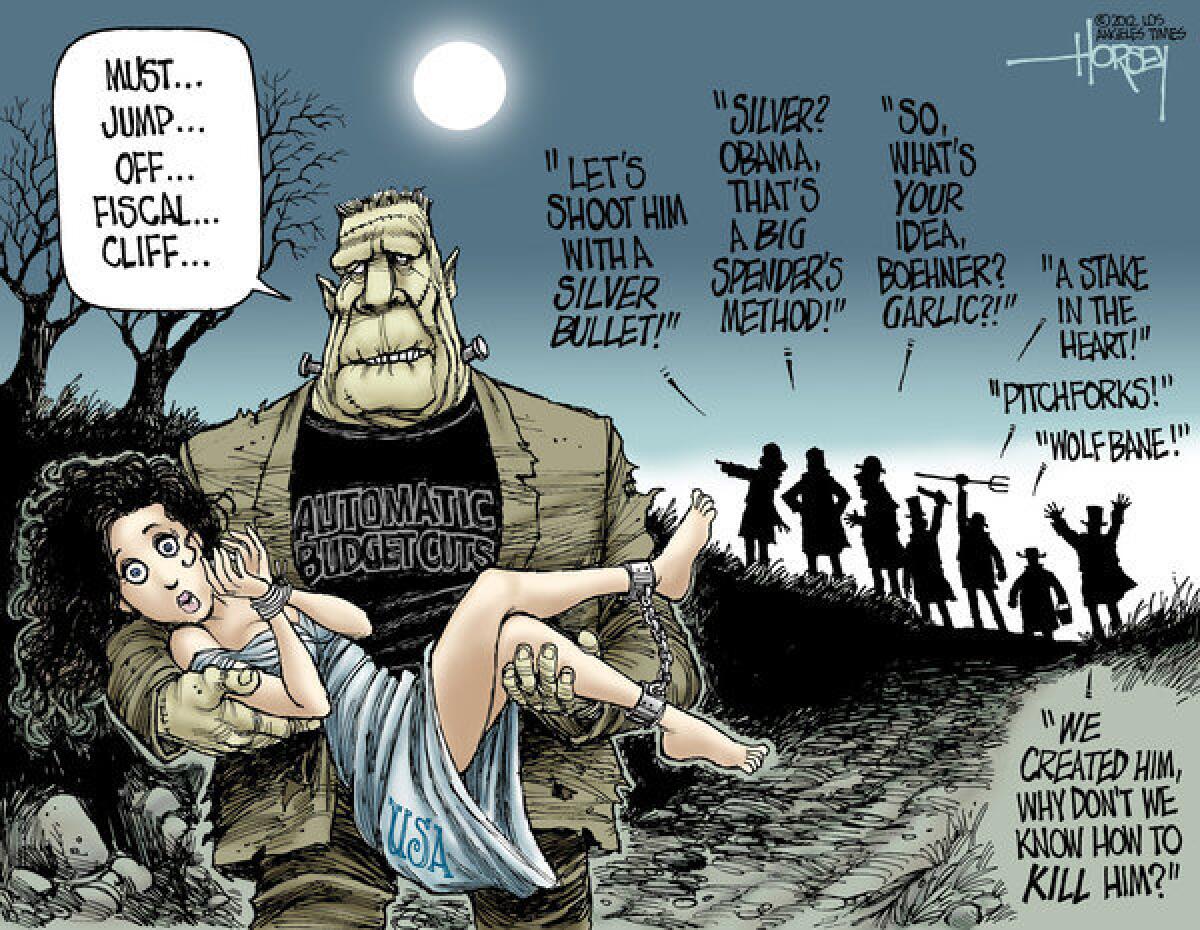Can the bozos who created the ‘fiscal cliff’ save us from it?

- Share via
On Monday, investors on Wall Street sent stocks soaring on the airy hope that the president and Congress will come up with a deal to avoid the “fiscal cliff” that looms at the close of the year. This only proves that the masters of finance have all the emotional sophistication of 13-year-old Justin Bieber fans.
Apparently, investors so want to believe that a budget deal will be struck to keep the U.S. from falling back into a deeper recession that they have abandoned informed skepticism and opted for wishful thinking. So, before we give too much credence to earnest promises by leaders in Washington, it might be useful to recall how we got wedged into this precarious corner.
The reason we are where we are is because our elected leaders put us here. The fiscal cliff -- a set of automatic draconian budget cuts and tax increases that will start taking effect on Jan. 1 -- was purposely created as a way to force the squabbling Congress and president into a budget deal. It is part of the Budget Control Act of 2011 that grew out of the near-disastrous debt ceiling showdown between President Obama and House Republicans.
PHOTOS: Top of the Ticket cartoons
The idea was that Republicans and Democrats would finally put differences aside and reach a budget compromise because both sides would be motivated by dread of automatic across-the-board cuts and tax hikes that would almost certainly hit the U.S. economy like a wrecking ball.
Well, that was in August of 2011 -- about the time the 2012 election campaign was kicking into gear -- and it was not until election day passed two weeks ago that anyone got serious about the looming deadline. With all that time wasted, congressional leaders came out of a White House meeting last week insisting that they could scrape together a deal before Dec. 31.
Much was made of Speaker of the House John Boehner’s conciliatory tone following that gathering, but the specifics of what he said seemed as rigid as ever. Boehner and his caucus -- and his Budget Committee chairman, Paul Ryan -- still insist they will not allow taxes on the wealthy to go back to the level of the 1990s. (That was a prosperous time, remember, before President George W. Bush arrived on the scene and slashed taxes, thereby adding to the government’s inability to pay its bills.)
On the Democratic side, House Minority Leader Nancy Pelosi is saying there is no way she will go for a deal that does not increase taxes on millionaires and billionaires. In less confrontational terms, Obama has said the same thing.
Many folks who claim to be political experts say this is mere posturing and that both sides will give up something to get a deal done -- with Republicans giving up more because the president is in a commanding negotiating position having just won reelection. Perhaps they are right, but the kind of hardheaded political calculation that used to get deals done in the days of Lyndon Johnson or Tip O’Neill has given way to ideological purity.
Congress is now filled with people like tea party cheerleader Michele Bachmann who has said that maybe it would not be such a bad idea to let the country go over the fiscal cliff. Boehner will have a tough enough time cajoling Ryan into any kind of compromise; he is unlikely to ever get crusaders like Bachmann and her hyper-conservative compatriots to give him an inch or a vote.
Hard-line liberals will also be difficult to move, especially if a proposed deal threatens the status quo in Social Security or Medicare. What is needed in the House and Senate is a bipartisan effort of folks in the center. That’s where all the work used to get done in the old days, but it has been a long time since anyone has pulled together a coalition of rational compromisers.
Given their track record, it is hard to see how the same crew that has run the most dysfunctional Congress in American history can suddenly transform themselves into statesmen in the few waning days of this ragged old year. Prepare to find out what is at the bottom of that cliff.
More to Read
A cure for the common opinion
Get thought-provoking perspectives with our weekly newsletter.
You may occasionally receive promotional content from the Los Angeles Times.







